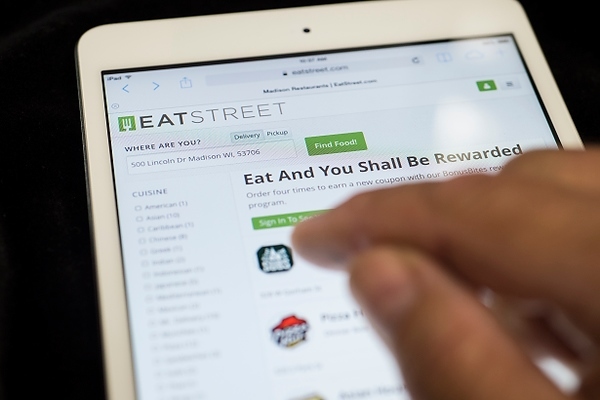Menu for success: EatStreet finds fast growth in fast delivery

A customer uses a tablet computer to navigate EatStreet, an online takeout food ordering system developed by three UW–Madison students. The list of restaurants it offers has grown from 2,500 on January 1 to 6,000 today.
It’s startup city at the offices of EatStreet in downtown Madison: bikes in the corridors; backpacks in the corners; construction workers running cable for the large new office that will be filled within weeks by engineers and product managers.
Business is booming, says Matt Howard, EatStreet’s president. The company — a coast-to-coast, online restaurant ordering service — has more than doubled its list of customers since January, and it’s just received a $6-million investment.
As the money filters in, Howard has no plans to remove the foosball table, the pingpong table, the giant flat screen TV — or even the kegs stacked on the porch overlooking Lake Monona.
EatStreet, a young Web-based company formed by three University of Wisconsin–Madison students, is riding to success on a simple premise: Present menus from dozens — even hundreds — of local restaurants at a single website. Make ordering fast and easy. Don’t compete with your customers — just bring them more business.
Eric Martell (left) and Matt Howard, cofounders of EatStreet, in the new workroom at the company’s offices in Madison. EatStreet has 36 full-time and 30 part-time employees.
Photo: David Tenenbaum
Howard, 25, who grew up in tiny Larsen, Wisconsin, about 100 miles northeast of Madison, says the seed for the business was planted in 2009. He and cofounder Eric Martell had ordered takeout online, and the delivery driver said, “You should stop, they are charging you to use the service. Just call the order in.”
The three cofounders met as students at UW–Madison. Alex Wyler, like the other two, is also 25.
We thought, “There’s got to be a better way,” says Howard. It was the summer of his sophomore year, and he was selling cars. “Eric said, ‘You sign the restaurants and Eric and I will build the website. They started building it in July 2009, I signed a few restaurants up, and we launched on February 1, 2010.”
Noticing your own frustrations can be a good basis for a business plan, says John Surdyk, an entrepreneurship expert at UW–Madison. “They had a simple idea that solved a problem for themselves and for many other people.”
Surdyk, director of the G. Steven Burrill Business Plan Competition in the Wisconsin School of Business, notes that EatStreet has also benefited from being hatched on a campus that is focusing on entrepreneurship. The founders’ first application to the competition proved to be a learning experience, says Surdyk. “They had a company and were already getting underway, but they did not have a credible plan of action.”
“I remember a phone call from Matt the next morning: ‘How quickly can we get into the office space? I’m tripping over Ethernet cords!’”
John Surdyk
After being turned down, Surdyk says, “they availed themselves of advice from the judges and others, and came back the second time in 2011 and won.” Free office space was part of the prize. “I remember a phone call from Matt the next morning: ‘How quickly can we get into the office space? I’m tripping over Ethernet cords!’”
Tripping over cords is less of a problem at the growing EatStreet offices near the state Capitol.
The company typically enters a new market (it currently has a presence in nearly 100 cities from Anchorage to Miami) by selling door-to-door, using a simple pitch, Howard says. “’We’ll put your menu up on the Web within a week, and you only pay us if we sell for you.’”
Simplicity matters on the website and the mobile apps, Howard says. “The first order may take three to five minutes, depending on how much poking around you do at different restaurants. Once you pick your restaurant, it’s under two minutes. All you are doing is ordering food, we are not trying to sell you something else. If there is any barrier, you are not going to use our service.”
Having signed that $6 million investment agreement in early April, EatStreet is filling out its floor space. From 16 full-time employees at the start of the year, it’s reached 36 now, with another 30 part-timers.
“We’ve more than doubled in the last 100 days, and that’s added many gray hairs, but we are very happy. We’re not going to slow down.”
Matt Howard
The list of restaurants has mushroomed from 2,500 on January 1 to 6,000 today. “We’ve more than doubled in the last 100 days, and that’s added many gray hairs,” says Howard (who shows none), “but we are very happy. We’re not going to slow down.”
Close ties to the university continue, Howard says. EatStreet hires 20 paid interns from UW–Madison. Howard talks to students considering forming their own startups, and is set to judge the next edition of the business plan competition he won.
“Before we left, we had to ask, ‘Will bikes always be welcome in the hallways?’ Yes,” Howard says. More important: Will EatStreet stay in Madison? Again, yes. “When am I moving to San Francisco? It comes up all the time. We don’t plan on moving. We have the support system we need, are getting the capital we need, and we can hire recent UW grads, so we get talented people.”
Then he gestures out his window toward Lake Monona: “We love where we are.”
Tags: business, entrepreneurship, food, spinoffs, technology




